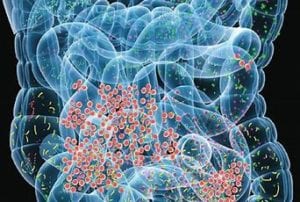Written by Taylor Woosley, Staff Writer. Results of this cross-sectional observational study using data from 164 subjects in the ADRC shows that preclinical AD status was most strongly associated with microbial pathways involved in arginine and ornithine degradation (P < 0.001), while the pathways most associated with healthy status was glutamate degradation (P < 0.001).
 Dementia is a health care problem with an enormous economic and societal impact, and the most common type of dementia is Alzheimer’s disease (AD)1. In 2010 the worldwide number of people suffering from dementia was approximately 35.6 million and is expected to triple by 20502. Central neuropathological hallmarks of AD include the deposition of amyloid-β (Aβ) in the brain parenchyma and the cerebral vasculature, along with the presence of intraneuronal neurofibrillary tangles and the gradual loss of synapses3.
Dementia is a health care problem with an enormous economic and societal impact, and the most common type of dementia is Alzheimer’s disease (AD)1. In 2010 the worldwide number of people suffering from dementia was approximately 35.6 million and is expected to triple by 20502. Central neuropathological hallmarks of AD include the deposition of amyloid-β (Aβ) in the brain parenchyma and the cerebral vasculature, along with the presence of intraneuronal neurofibrillary tangles and the gradual loss of synapses3.
In recent years, dysfunction of the microbiota-gut-brain axis has been implicated in the pathogenesis of AD4. AD has been hypothesized to be associated with a dysbiosis of microbes in the intestine and the association between gut microbiota and AD is also related to the central role of inflammation in the development of AD5. Numerous studies indicate that gut microbiota may have an influence in synthesizing various neurotransmitters and neuromodulators, which affect gut-brain communication and brain function6. Research has shown the significant differences in quantity and quality of gut microbiome in AD patients compared to mentally healthy controls of similar ages7.
Ferreiro et al. conducted a cross-sectional observational study using data from the Knight Alzheimer’s Disease Research Center (ADRC) cohort of individuals with and without preclinical AD to analyze whether individuals with preclinical AD may have an AD-associated dysbiotic gut microbiome. Subjects (n=164) aged 68 to 94 years old (45% male) underwent PET and MRI imaging, lumbar puncture for cerebrospinal fluid (CSF) samples, stool sampling, phlebotomy, and clinical and cognitive testing, which included clinical dementia rating (CDR) scale completion every 3 years (<65 years) or annually (≥65 years old). Stool samples were accompanied by 24-hour diet logs to access subject’s nutritional profiles. Fecal metagenomic sequencing and profiled abundance of microbial taxa and microbial pathways were performed from the obtained samples.
115 healthy participants and 49 subjects with preclinical AD status were included in the final analysis. Preclinical AD was defined as having a CRD score equal to 0 and being Aβ positive. Student’s t or chi-square tests were utilized to determine differences in demographics or clinical covariates between healthy and preclinical AD groups. Differences in age, body mass index, apolipoprotein ε4 (APOE ε4) carrier status, diabetes, and hypertension were included as variables in the linear regression and machine learning models. Significant findings of the study are as follows:
- Results of principal coordinates analysis (PCoA) shows global differences in gut taxonomic profiles by preclinical status (P = 0.036), per-mutational ANOVA (PERMANOVA); (P = 0.046), one-way ANOVA on PCoA1 coordinates by AD status.
- Preclinical AD status explained significant multivariate taxonomic differences in the cohort (P = 0.040, PERMANOVA; P = 0.0004 and P = 0.0003, one-way ANOVA by AD status on CAP1 and CAP2 coordinates, respectively).
- Preclinical AD status was most associated with species Dorea formicigenerans (P < 0.001), Oscillibacter 57_20 (P < 0.001), Faecalibacterium prausnitzii (P < 0.001), Coprococcus catus (P < 0.001), and Anaerostipes hadrus (P < 0.001).
- Preclinical AD status was most strongly associated with microbial pathways involved in arginine and ornithine degradation (P < 0.001), while the pathways most associated with healthy status was glutamate degradation (P < 0.001).
Results of the cross-sectional observational study show that subjects with preclinical AD had differing microbiome composition and microbial function potential compared to participants with a healthy status. These findings suggest that gut microbiome may change early on in AD development before apparent cognitive impairment. Further research is necessary to strengthen these associations in broader, long-term AD cohorts.
Source: Ferreiro, Aura L., JooHee Choi, Jian Ryou, Erin P. Newcomer, Regina Thompson, Rebecca M. Bollinger, Carla Hall-Moore et al. “Gut microbiome composition may be an indicator of preclinical Alzheimer’s disease.” Science Translational Medicine 15, no. 700 (2023): eabo2984.
© 2023 The Authors, some rights reserved; exclusive licensee American Association for the Advancement of Science. No claim to original U.S. Government Works
Click here to read the full text study.
Posted August 24, 2023.
Taylor Woosley studied biology at Purdue University before becoming a 2016 graduate of Columbia College Chicago with a major in Writing. She currently resides in Glen Ellyn, IL.
References:
- Serrano-Pozo A, Growdon JH. Is Alzheimer’s Disease Risk Modifiable? Journal of Alzheimer’s disease : JAD. 2019;67(3):795-819. doi:10.3233/jad181028
- Khan S, Barve KH, Kumar MS. Recent Advancements in Pathogenesis, Diagnostics and Treatment of Alzheimer’s Disease. Curr Neuropharmacol. 2020;18(11):1106-1125. doi:10.2174/1570159×18666200528142429
- Rostagno AA. Pathogenesis of Alzheimer’s Disease. Int J Mol Sci. Dec 21 2022;24(1)doi:10.3390/ijms24010107
- Liu S, Gao J, Zhu M, Liu K, Zhang HL. Gut Microbiota and Dysbiosis in Alzheimer’s Disease: Implications for Pathogenesis and Treatment. Mol Neurobiol. Dec 2020;57(12):5026-5043. doi:10.1007/s12035-020-02073-3
- Angelucci F, Cechova K, Amlerova J, Hort J. Antibiotics, gut microbiota, and Alzheimer’s disease. J Neuroinflammation. May 22 2019;16(1):108. doi:10.1186/s12974-019-1494-4
- Megur A, Baltriukienė D, Bukelskienė V, Burokas A. The Microbiota-Gut-Brain Axis and Alzheimer’s Disease: Neuroinflammation Is to Blame? Nutrients. Dec 24 2020;13(1)doi:10.3390/nu13010037
- Askarova S, Umbayev B, Masoud AR, et al. The Links Between the Gut Microbiome, Aging, Modern Lifestyle and Alzheimer’s Disease. Front Cell Infect Microbiol. 2020;10:104. doi:10.3389/fcimb.2020.00104
